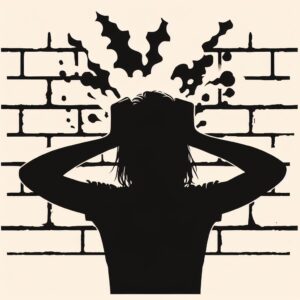
Table of Contents
Understanding the Belief in the Full Moon’s Impact on Sleep
For centuries, the full moon has been associated with mystical powers and inexplicable phenomena. One such belief is its alleged influence on human sleep patterns. Many people claim that their sleep is disrupted during a full moon, experiencing restless nights, vivid dreams, or even insomnia. But is there any truth to this age-old myth? In this article, we delve into the fascinating topic of the full moon’s effect on sleep. We will explore scientific studies, psychological factors, and biological mechanisms to separate fact from fiction and gain a deeper understanding of whether the full moon truly affects our sleep quality.
1. The Myth of the Full Moon and Sleep Patterns
Understanding the Belief in the Full Moon’s Impact on Sleep
Ah, the full moon – that big, bright orb in the sky that has captivated humans for centuries. It has been the subject of legends, folklore, and even songs. But one persistent belief that seems to have stood the test of time is that the full moon can wreak havoc on our sleep patterns.
We’ve all heard stories of how people toss and turn, unable to catch a wink of sleep during a full moon night. But is there any truth to this age-old tale, or is it just another case of lunar lunacy? Let’s dive in and find out!
2. The Influence of Moon Cycles on Human Sleep
Exploring the Concept of Lunar Rhythms and Human Sleep
The idea that moon cycles can influence our sleep patterns is not as far-fetched as it may sound. Humans, like many other organisms, have internal biological clocks that are influenced by various environmental cues, including light and darkness.
These internal clocks, known as circadian rhythms, play a vital role in regulating our sleep-wake cycles. And here’s where the moon comes into the picture. The brightness of the full moon can disrupt our exposure to darkness, which, in turn, can impact our sleep quality.
Theories on How Moon Cycles May Affect Sleep Patterns
So, how exactly does the full moon mess with our sleep? Well, there are a few theories floating around. One idea is that the increased brightness of the moon affects the production of melatonin, the hormone responsible for regulating sleep. Another theory suggests that the gravitational pull of the moon may somehow influence our sleep patterns, much like how it affects the tides.
While these theories are intriguing, it’s essential to remember that they are still just theories. So, let’s move on and see what scientific studies have to say about the matter.
3. Scientific Studies on the Full Moon and Sleep Quality
Reviewing Research Methodologies and Findings
Researchers have conducted numerous studies to investigate the relationship between the full moon and sleep quality. Some studies have found a correlation between sleep disturbances and the lunar cycle, while others have found no significant link.
But here’s the catch: many of these studies have limitations. Some relied on self-reported sleep data and subjective assessments, which could be influenced by factors like expectation bias. Others didn’t control for external variables that could impact sleep quality, such as noise or temperature.
In short, while some studies suggest a potential connection between the full moon and sleep disturbances, more rigorous research is needed to draw any definitive conclusions.
Contradictory Studies: Inconsistencies in Results
Adding to the confusion, various studies have come up with contradictory findings. One study may report increased sleep disruptions during the full moon, while another finds no noticeable differences. It’s like the moon is playing a sneaky game with us, hiding its true impact on our sleep patterns.
With such inconsistent results, it’s challenging to determine whether the full moon genuinely affects our slumber or if it’s just a case of lunar coincidence. But don’t fret just yet; there’s still one more factor we need to consider – our psychological state during a full moon.
4. Psychological Factors and Sleep Disturbances during Full Moon
Psychological Associations with the Full Moon and Sleep
While the scientific jury is still out on the direct influence of the full moon on sleep, there’s no denying the psychological associations we have with it. The full moon has long been associated with mystery, supernatural events, and well, howling at the moon. These psychological associations can inadvertently contribute to sleep disturbances during a full moon.
When we anticipate sleep troubles during a full moon, we may experience heightened anxiety or stress, making it harder to fall asleep. It’s like our minds play tricks on us, creating a self-fulfilling prophecy of sleeplessness.
Examining Anxiety, Stress, and Sleep Disorders
Moreover, anxiety and stress, which are known culprits of sleep disturbances, can be heightened during the full moon. So, even if the moon itself doesn’t have a direct impact on our sleep, our psychological response to it may lead to restless nights.
Furthermore, individuals with pre-existing sleep disorders may be more susceptible to perceived sleep disturbances during the full moon. Their already delicate sleep patterns may be more easily disrupted, leading to a perception of the moon’s interference.
In conclusion, while the myth of the full moon’s influence on sleep patterns continues to intrigue us, the scientific evidence remains inconclusive. Whether it’s the moon’s gravitational pull or simply the power of suggestion, the impact of the full moon on our slumber remains a mystery. So, the next time you find yourself tossing and turning during a full moon, blame it on the moonbeams or just enjoy the spectacle from your window – it’s a beautiful sight either way!

5. Biological Mechanisms: Exploring the Impact of Moonlight on Sleep Hormones
The Role of Melatonin in Sleep Regulation
When it comes to sleep, one hormone that plays a crucial role is melatonin. Produced by the pineal gland in our brain, melatonin helps regulate our sleep-wake cycle. It’s also known as the “hormone of darkness,” as its production increases at night, helping us fall asleep.
Moonlight Exposure and Melatonin Suppression
Some studies have suggested that exposure to moonlight, particularly during a full moon, could disrupt melatonin production. The idea is that the bright light from the moon might trick our bodies into thinking it’s still daytime, reducing melatonin levels and making it harder to sleep.
6. Sleep Behaviors and Anecdotal Evidence: Debunking or Supporting the Full Moon Effect
Common Sleep Issues Reported during Full Moon
You’ve probably heard people claim that they have trouble sleeping during a full moon. Some anecdotal evidence suggests that sleep disturbances such as trouble falling asleep, waking up frequently during the night, or experiencing vivid dreams may be more prevalent during this lunar phase.
Alternative Explanations for Sleep Disruptions
While the full moon gets blamed for our sleep troubles, it’s essential to consider other factors that can affect our sleep quality. Things like stress, diet, physical activity levels, and even the temperature and comfort of our sleep environment can play a role in our ability to get a good night’s sleep.
7. Practical Tips for Better Sleep During Full Moon Nights
Creating a Sleep-Friendly Environment
No matter the phase of the moon, having a conducive sleep environment can help improve your sleep. Make sure your bedroom is dark, quiet, and at a comfortable temperature. Consider using blackout curtains or a sleep mask to block out any unwanted moonlight.
Establishing Healthy Sleep Habits
Regardless of lunar influence, maintaining consistent sleep habits is key. Stick to a regular sleep schedule, incorporate relaxation techniques before bed, limit screen time, and avoid stimulating substances like caffeine and nicotine in the evening. These habits can promote better sleep, regardless of what’s happening in the night sky.
8. Conclusion: Separating Fact from Fiction – Is There a Real Connection?
Summarizing the Findings and Controversies
While some studies suggest a potential link between the full moon and sleep disruptions, the evidence is far from conclusive. Many factors can impact our sleep, and attributing sleep issues solely to the full moon might be oversimplifying the situation.
Considering the Need for Further Research
To truly determine whether there’s a legitimate connection between the full moon and sleep, more rigorous scientific research is needed. Large-scale studies with controlled conditions and objective sleep measurements could shed more light on this lunar mystery.
Remember, whether you blame your sleepless nights on the full moon or not, the most important thing is to prioritize healthy sleep habits and create an environment that promotes restful slumber. So, for now, sleep tight, regardless of the moon’s luminosity!
Separating Fact from Fiction – Is There a Real Connection?
Summarizing the Findings and Controversies
After a thorough examination of the available evidence, it becomes clear that the belief in the full moon’s impact on sleep patterns is a topic filled with contradictions and uncertainties. While some studies suggest a potential link between lunar cycles and sleep disruptions, others fail to find any significant association. Psychological factors such as anxiety and stress may play a more substantial role in sleep disturbances during a full moon. Additionally, biological mechanisms, particularly the influence of moonlight on melatonin, require further investigation. As we continue to explore the complexities of sleep and its relationship with lunar cycles, it is evident that more rigorous research is needed to conclusively determine whether a full moon truly affects our sleep. Until then, it remains a captivating topic that captures both curiosity and skepticism alike.

FAQ
1. Does the full moon really affect everyone’s sleep?
The impact of the full moon on sleep patterns appears to vary from person to person. While some individuals may experience disrupted sleep during a full moon, others may not notice any significant changes. Sleep quality can be influenced by numerous factors, including individual susceptibility, psychological variables, and overall sleep hygiene. It is important to recognize that the full moon’s effect on sleep is not universal and may differ among individuals.
2. Are there any scientific studies supporting the connection between the full moon and sleep disturbances?
Yes, several scientific studies have explored the potential link between the full moon and sleep disruptions. Some studies have reported an increase in sleep disturbances, such as decreased total sleep time, longer sleep onset latency, and altered sleep structure during full moon nights. However, it is worth noting that these findings are not consistent across all research, with contradictory results also being reported. The scientific literature on this topic remains inconclusive and requires further investigation.
3. Are there alternative explanations for sleep disturbances during a full moon?
Yes, there are alternative explanations for sleep disturbances that may occur during a full moon. Psychological factors like anxiety, stress, and anticipation of sleep disturbances can significantly impact sleep quality. Additionally, changes in environmental factors such as increased brightness during moonlit nights or noise disturbances can disrupt sleep patterns. It is essential to consider these alternative explanations alongside the potential influence of lunar cycles on sleep disturbances.
4. What can I do to improve my sleep during a full moon?
If you find that your sleep is affected during a full moon, there are several steps you can take to improve sleep quality. Creating a sleep-friendly environment by ensuring a comfortable bed, a dark and quiet room, and a relaxing bedtime routine can promote better sleep. Practicing good sleep hygiene, such as maintaining a consistent sleep schedule and avoiding stimulants before bedtime, can also be beneficial. Remember that individual responses to the full moon may vary, so it is essential to find what works best for you to optimize sleep during this time.




